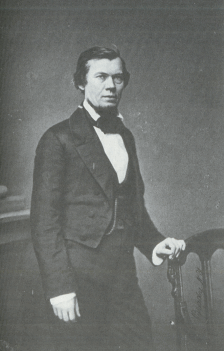Raleigh, N.C., Dec. 1860.
To His Excellency, John W. Ellis,
Governor of the State of North Carolina:
Sir: I have the honor to inform you that I have been
duly appointed a Commissioner from the State of Mississippi to
the State of North Carolina. I have been instructed by the
Governor of Mississippi, to report myself, in person, to your
Excellency and through your kind offices, to inform the people of
this Commonwealth "that the Legislature of Mississippi has
passed an act calling a Convention of the people of the State, to
consider the threatening relations of the Northern and Southern
sections of the United States; aggravated by the recent election
of a President upon principles of hostility to the States of the
South, and to express the earnest hope of Mississippi that North
Carolina will co-operate with her, in the adoption of efficient
measures for the common defence and safety of the South."
It affords me great pleasure to accept this
appointment, and to obey these instructions; yet I most sincerely
regret the public necessity which impels my adopted State to ask
for the counsel and co-operation of my native State. Common
dangers threaten the peace, honor, and safety of both; and it is
certain that an unresisting submission to the aggressive and
hostile policy of the Northern States will inevitably involve
both in a common humiliation and ruin. The crisis demands action.
It is unbecoming a free people to close their eyes to the issue
forced upon them, and to cry peace, peace, when there is no
peace. The antagonism of opinion, upon the questions growing out
of the recognition by the Constitution of the right of property
in slaves, so long and angrily discussed, has at last culminated,
in the adoption, by a majority of the Northern people of the
doctrine of the "Irrepressible Conflict." The leading
idea of this creed is that the Union of these States cannot
endure, half of them slave-holding, and the other half
non-slave-holding. This conflict is to be inaugurated under the
forms of the Constitution on the 4th
of March next, and if adhered to and carried out, the assertions
of its most violent advocates that "Freedom is
triumphant" and "that slavery is overthrown," are
self evident propositions.
It is admitted that each State must decide for
herself, both the mode and measure of redress for present and
prospective grievances. One destiny, however, awaits all the
slave-holding States of this Union, and fate has indissolubly
linked their fortunes together: Therefore, it is meet, and wise,
and proper and expedient, that they should consult and advise
together, for their common defence and general welfare. Thus the
hasty and precipitate will be checked, the laggard and spiritless
aroused to action, and a universal confidence will be felt, that
our rights will be secure, and our government placed on the
safest and surest foundation.
Mississippi is content with the compact which our
fathers formed. The Constitution of the United States already
affords guarantees which are ample for our security. But they are
found on parchment only. The people of the Northern States have
not kept faith with us. Not only have a majority of the
non-slaveholding States rendered all legislation for our
protection nugatory and inoperative by State enactments, but on
the 6th of November
last, a majority of the people of all the free States endorsed a
platform of principles in direct conflict with the Constitution
and the decisions of the Supreme Court, and thus the will of a
numerical majority --- a majority trained from infancy to hate
our people and institutions, are to be substituted in their
stead.
The Executive and Judicial departments of the
government, and the Senate of the United States have always held
that property in slaves was recognized by the Constitution, and
therefore, under a common flag was entitled to protection. The
dominant party denying this proposition, and thus, by their
construction, the Constitution will be changed, this common
Government will be revolutionized, and instead of throwing its
broad shield over all the citizens of all the States, protecting
each and all equally in the possession and enjoyment of their
rights of property, it will be perverted into an engine for the
destruction of our domestic institutions, and the subjugation of
our people.
The question which is now submitted both to
Mississippi and North-Carolina, is this, shall we sit quietly
down without a murmur, and allow all our constitutional rights of
property to be taken away by a construction of the Constitution
which originates in hostility and hatred, or shall we, as men who
know their rights, bestir ourselves, and by a firm, united and
cordial "co-operation," fortify and strengthen them,
that they may be transmitted unimpaired to our children, and our
children’s children, throughout all generations. Wisdom
dictates that all the questions arising out of the institution of
slavery, should be settled now and settled forever.
A people jealous of their liberty will detect danger
while it is yet afar off and provide the remedy. If ever there
was a people answering this description the past glorious history
of North-Carolina will point out your fellow-citizens as that
people.
I bear this message of Mississippi to you, and through
you, to the people of North- Carolina; and I hope that you will
allow me to inform Mississippi that North-Carolina is fully alive
to the importance of the present crisis, and "will
co-operate with her in the adoption of efficient measures for the
common defence and safety of the South."
I have the honor to be, with
great respect,
Your obedient servant,
J. Thompson
Commissioner from Mississippi.
|
